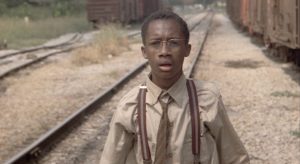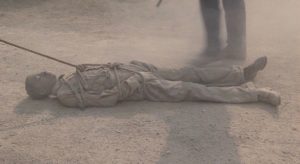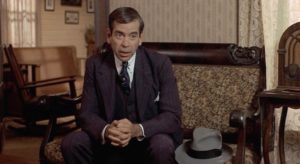Places in the Heart (1984). Written and directed by Robert Benton (Academy Award for Best Original Screenplay). Starring Sally Field (Academy Award for Best Actress). John Malkovich, and Danny Glover. PG, 111 min.
The opening to writer-director Robert Benton’s Places in the Heart is a set up, to be sure, but a most telling and beneficial one, albeit in a rather darksome way. Benton’s film recalls his childhood in rural Depression-era Texas, and supposedly many of the characters are modeled on people he knew. From the look of the long opening montage of scenes from daily life in Waxahachie, over which the credits roll, the viewer would think that this place is close to Eden. The landscape is quite beautiful, and the people, praying over meals in restaurants, as well as providing meals for homeless wanderers (who also pray), seem decent and good. There are brief glimpses of segregation, but it all seems rather benign. Indeed, both races seem equally devout (The hymn “Blessed Assurance” plays over the long sequence). The same tranquil reassurance continues in the first scene where we meet the Spalding family: Edna (Sally Field), mother and housewife, the cutest ever, and Royce (Roy Baker), father and breadwinner and local sheriff, and two darling children, son Frank and daughter Possum, who is just about as cute as her mother. The family prays over meals (and the prayer is articulate and deeply sincere). Happy days, especially in contrast to these days. We are lulled, in a swoon of wishing for a return to such an ideal America.
And then it happens. At Sunday dinner, sheriff Royce must run off to tend to an African American mid-teenager who got roundly drunk and then took his father’s revolver and is now doing target practice in the train yard. The sheriff tries to cajole Wiley into putting down the gun, for they seem to be on friendly terms, and Wiley thinking his pistol now empty points it, jokingly, in the sheriff’s direction and pulls the trigger only to have it fire a live round that promptly kills the sheriff. And no one is more surprised than Wiley, who otherwise seems a very nice fellow.

Accidents happen all the time, indeed. This one has special bite, though, given that bucolic perfection of the opening sequences, and Benton shaped the sequences so this would leave us gasping, as well it should. And evil happens—that gaping crevasse in this world that swallows the innocent whole: storm, disease, traffic, guns, and the list goes on. This we tend to understand and work hard to protect all from injury and death. Usually.
The point is, I think, don’t kid yourself, no matter how much you’d like to. The enormous jolt of this inadvertent wrongness surely disrupts illusions about tranquility, such as the introduction to the town suggested. Wife loses husband and family support; children lose father. And that is just the start, for things get much worse, and that is due, predictably perhaps, to people, people on the make or angry or just plain mean. Rotten people, and they come in all shapes. And so they do. The sheriff’s body is hardly cold before the Klan, full of good old local boys, gets even, lynching Wiley and then dragging him behind a truck so they can show off their “getting even” to the widow and her kids.

And before the film ends the terrorists (the Klan) will show up again. And then there’s the local banker, a church-going man, who tells the new widow to sell her farm to the bank and send her kids to live with relatives, and the greed is oozed up in churchy concern for the widow.

Then the local mill owner tries to bilk the widow with inferior cotton seed, a gesture inspired again by plain-old greed and also, in this instance, historic sexism. And so it goes, on and on. So much for the widows and orphans. Isaiah and Amos would not be pleased, no matter how many times the locals praise Jesus. Predatory is predatory, no matter if it comes from farmers or bankers.
There’s no heading off the caprice of destruction that out of nowhere befalls individual people and usually whole families along with them. This is mystery, a who-knows-why, “the question mark turned like a fish hook in the human heart” (Peter De Vries). Another sort of evil devours people by instigating enmity between people who should know better, especially in the wake of the prophets and the Christ. Faith without praxis doesn’t get one far, so says James. Good work, Mr. Benton, point taken.
written by Roy Anker
Sign Up for Our Newsletter!
Insights on preaching and sermon ideas, straight to your inbox. Delivered Weekly!
Categorized into Evil
Places in the Heart (1984) – 1